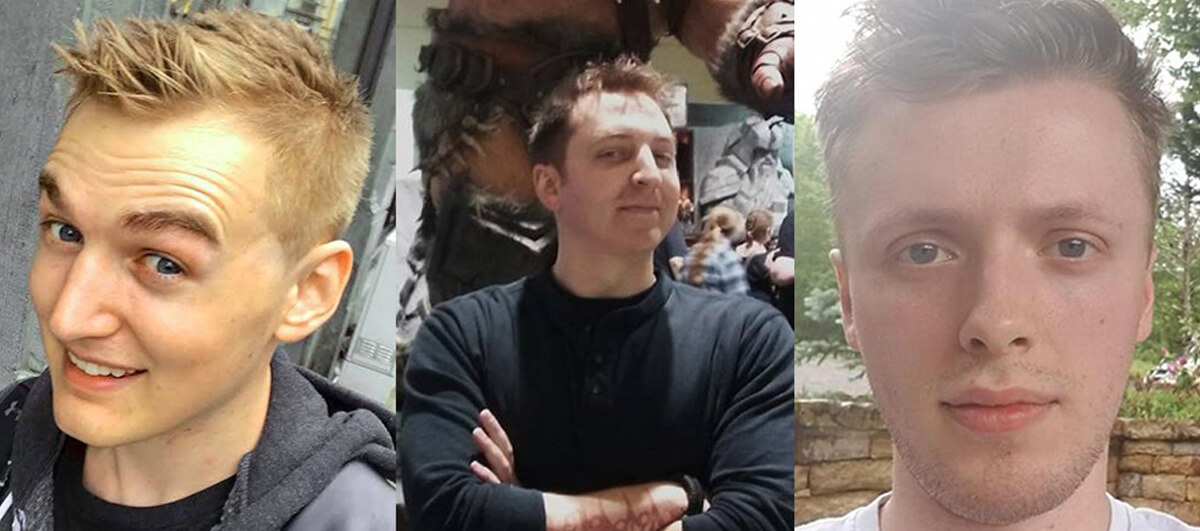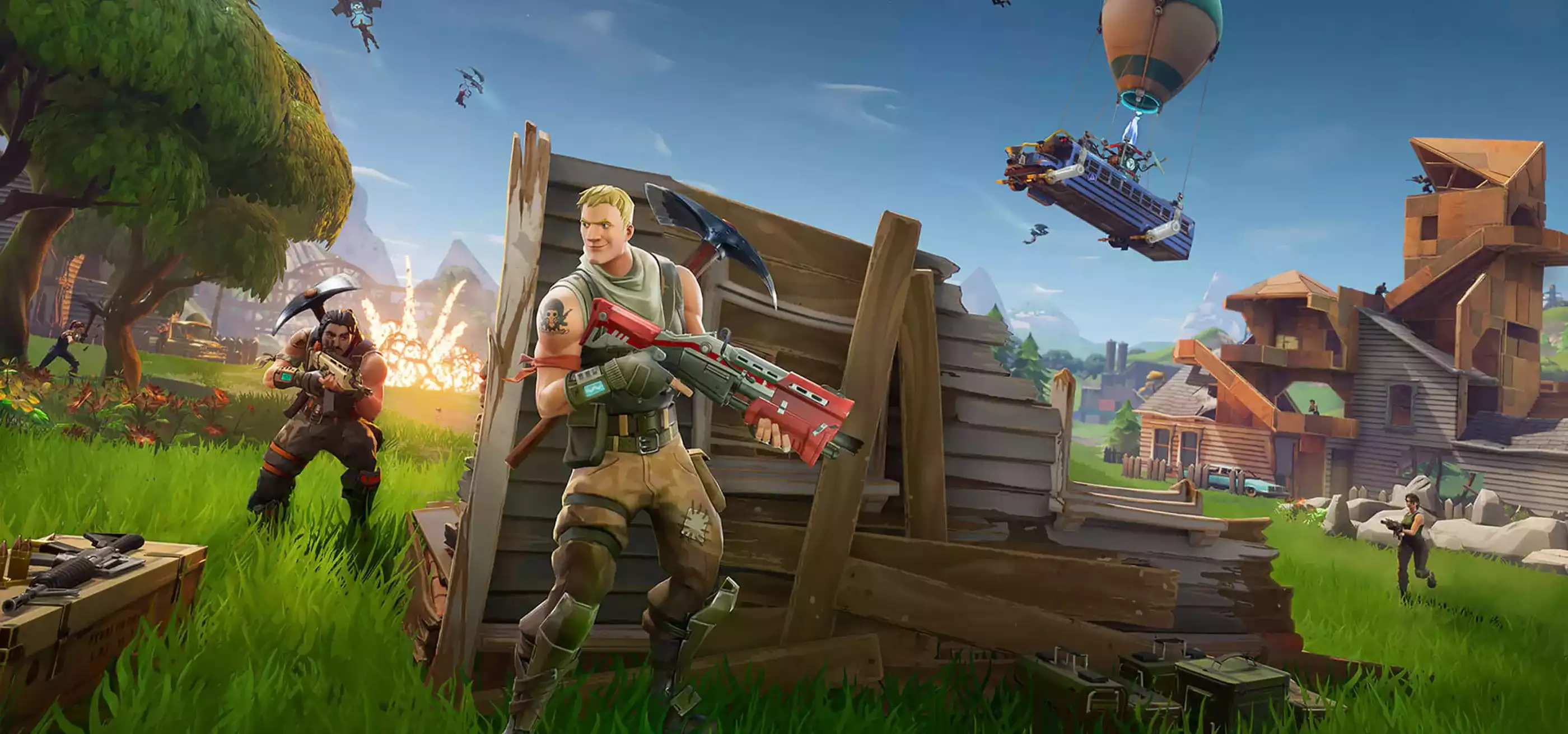It’s difficult to overstate the impact of Epic Games’ Fortnite. If the game’s free-to-play Battle Royale mode — pitting 100 players against each other for the title of last person standing — seems like it’s overtaken the world, that’s probably because, objectively, it has.
A poll from this past March found that 16.3 percent of the 12 million PC gamers surveyed were playing Fortnite. That’s just under 2 million people. Given that Fortnite is available not just on PC — but also on Xbox One, PS4, and mobile — it’s safe to say Fortnite’s skyrocketing fan base has turned it into a bonafide cultural phenomenon. It’s not just the players who love it — Fortnite is setting new precedents for e-sports spectatorship too. In March, a Spanish Battle Royale tournament live streamed on YouTube broke the record for the biggest single live-gaming stream of all time, with 1.1 million concurrent viewers and 42 million viewers in total.
“It’s been crazy,” DigiPen BS in Real-Time Interactive Simulation graduate and Epic Games technical sound designer Seth Weedin says. “We’ve been in the trenches this whole time, so I remember watching it on Twitch when it had 10,000 viewers max as people were just trying it out wondering, ‘What is this game?’”
“For us, we’ve kind of always had Fortnite around us,” says BA in Game Design graduate and Epic Games technical designer Aaron Johnson. “So it’s less like we’re watching it take over the world and more like we’re bringing everyone else into our world now.”

Weedin, Johnson, and BS in Computer Science in Real-Time Interactive Simulation graduate Stanley Hayes all landed jobs at Epic Games just a week after graduating in 2016. The batch hire wasn’t a coincidence — the trio had been working together on game projects since their sophomore year at DigiPen. They, along with five other students, were the founding members of Team Atmos, a student game team that made quite a splash with SubRay, an atmospheric underwater exploration game that won them the Claude Comair Game of the Year award in 2014. For their senior game project, they decided to take the original 2D SubRay and turn it into an immersive 3D virtual reality experience, SubRay VR.
“We only have four years at DigiPen,” Johnson laughs, “so we decided to take one game and make different versions of it until it was something we liked.”
Once Team Atmos had a polished working prototype, they decided to shop the game around at SEA VR, a virtual reality conference for developers in Seattle. Given that they had developed SubRay VR using the Unreal Engine, a game engine developed by Epic Games, the three were excited to run into Nick Whiting, Epic’s technical director of VR/AR, at the conference.
“We approached Nick and he had his laptop there, so we showed him our game,” Johnson says. “He asked us how long we’d been working on it and we said, ‘Oh, you know … a couple of months.’ And he went, ‘Wow! This looks great for a couple of months. And that started the ball rolling for Epic.”
The three kept in touch the following months as SubRay VR’s development continued. At one point, when Atmos was attempting to change the Unreal Engine version they were using to build SubRay VR, Epic invited them to come to their Seattle offices to assist them.
“Then from there, we just nailed an internship,” Johnson says.
The internship found Weedin, Johnson, and Hayes working on Epic Games’ first fully-fledged VR title, the futuristic first-person shooter Robo Recall for the Oculus Rift. While the game has since been hailed as one of the Oculus Rift’s killer apps, when the trio came on board as interns at Epic, the game was still in its prototype phase. “We had a lot of freedom to do exactly what we were doing at DigiPen, only in a professional setting — right out of the gate,” Weedin says.
The internship was only supposed to last three months, but the trio quickly made themselves indispensable.
“Our hands got into everything,” Johnson says. “So they couldn’t say, ‘Oh, you guys are done,’ because so much of the game was on our shoulders at that point.”
You don’t really have the ‘work on something and nobody sees it for months’ feature that’s typical of game development.”
Once they reached the limit for the internship, they became contractors. Once they hit the limit for contracting, Epic brought them on full-time. Before long, the trio transferred out to Epic’s North Carolina headquarters, where they would start working on Fortnite, a game that had been in development for a number of years.
Fortnite has become the poster child for the “games as service” model. Rather than simply releasing a game, selling it as a one-and-done package, and calling it a day, the new model is built around developers constantly updating a title and providing new content for players. In the free-to-play version of Fortnite, players have access to a rotating selection of purchasable skins and accessories for player avatars, new weapons and traps, new game modes, and changes to the map. What does that mean for the developers?
According to Hayes, who now works as a full-time gameplay programmer, it means the typical development cycle never really ends. “Constantly you’re writing code or making features or adding things that are live the next following couple of weeks,” he says.
“We got into this rhythm of every week we have a patch and we have new and exciting things for people to play,” Weedin says. “But that means that you constantly have to be thinking. Things are moving really fast, but it’s awesome.”
“You don’t really have the ‘work on something and nobody sees it for months’ feature that’s typical of game development,” Johnson says. “It’s more like, you work on a feature and you have immediate feedback on whether it’s working or not.”
While the model does mean working through lots of crunch periods, not having to keep your work in the dark also has its benefits.
“It’s super satisfying to see a change go out and be either positively or negatively received,” Johnson says. “You can interact with the community, and the next patch will fix a bug or change features in the way people wanted, which means we have a super tight relationship with the people playing our game at this point.”
Even after we’d go home from work we’d play it up until 2 a.m. with a squad of developers. You get to poke fun at people if there’s a bug and you know who did it.”
With Fortnite, Epic Games is breaking the old internet credo of “don’t read the comments.” On the contrary, the trio says they often scour Reddit and other online message boards for player reactions and opinions on game features.
Beyond just reading players’ thoughts online, the trio says they and their fellow developers often team up and go out into the wild themselves, playing Fortnitetogether to observe how players are receiving new features and content. “We all play the game quite a bit,” Weedin says. “Even after we’d go home from work we’d play it up until 2 a.m. with a squad of developers. You get to poke fun at people if there’s a bug and you know who did it. It’s fun, but you’ve all seen behind the curtain, so that does change the way you play the game.”
“Seth has the most Victory Royales out of the three of us,” Hayes laughs. “He’s the audio guy, so he uses secret sounds to win.”
Looking back, the three say that treating their DigiPen student games like professional dev projects was the key to landing their dream jobs at Epic. “It made it much more powerful to say, ‘This is real life right now, so let’s make it exactly like we would out in the field,’” Weedin says.
“During the day you have all this homework and classwork, so then after you get all of that done you get to work on your game. And that’s kind of like the reward at the end of the day,” Johnson says. “It feels really rewarding keeping that feeling going, because then work isn’t work — it’s having fun.”
“After graduation and working at Epic, it was so weird not to have other classes and be like, ‘No, no, no. All day you’re making your game.’” Hayes says. “It’s still kind of like, ‘What? That’s crazy!’”
